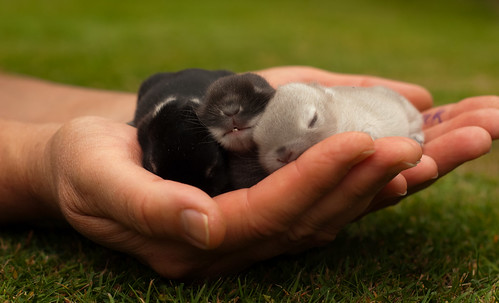When it comes to breeds of rabbits there is a huge choice from the adorable Mini Lops to the massive Flemish Giants. But more and more people are choosing to open their hearts and homes to a dwarf rabbit. In fact the Netherland Dwarf is one of, if not the, most popular breed worldwide today.
Many people refer to their small rabbits as dwarfs and you will often find people saying they have a 'Dwarf Lop' or 'Dwarf Lionhead'. However, to be an official 'dwarf' breed a rabbit must carry one half of the dwarf gene. The American Rabbit Breeders Association recognizes just two true dwarf breeds - the Dwarf Hotot (around 3lb) and the Netherland Dwarf (around 2.5lb).
But regardless of whether your bun is an official dwarf or just a very small version of another breed the question is always asked if caring for a dwarf bun is any different than for other breeds.
So, do dwarf rabbit breeds need special care?
The answer to this is not really. There are a couple of things you need to keep in mind with dwarf breeds but in general their care is the same as other rabbits.
Here are a few things you need to watch out for:
- Dwarf rabbits can often be more highly strung and harder to handle than larger breeds. And, while there are always exceptions to the rule, in general they actually need *more* space and exercise than a larger rabbit does as.
- Because of their obviously small size, dwarf rabbits look very much like prey to cats and dogs, particularly to dogs such as terriers that are bred to hunt and kill rats, mice and even rabbits. You may be best to consider choosing a larger rabbit if you have a dog or cat in the house.
- While it's not a proven scientific fact, many dwarf owners feel their dwarf bunnies have a more delicate digestive system. While that may or may not be the case with your dwarf bun, you still need to be very careful about the quantity of food you feed your bunny. Dwarfs are tiny creatures (2-3lbs) and can become overweight very quickly. A portion of 'treat' food e.g.: apple for a dwarf bun would be around a teaspoon!
- If your cage has wire at the bottom, take care to ensure that your dwarf bun's feet are not so small that they can slip through the wire. Change the wire to a smaller size hole or put something solid over it instead such as newspaper or cardboard. As with any rabbit, wire-bottomed cages need part of the floor to be covered with solid material so that the bun can give their feet a rest.
- Netherland Dwarfs are much more prone to dental problems because of their small, compact head shape and shortened jaw. This may mean a visit to the vet each month to have your bun's teeth trimmed which could become costly.
There is no doubt that dwarf rabbits and in particular the Netherland Dwarf, are very cute. However, as with any rabbit, they are not a low maintenance pet and it is 10-12 year commitment to take one on.
Make sure you're really ready to add a dwarf bun to your household before you fall in love with that cute little face and take him home.
Abbey Mitchell is a long-time animal lover and rabbit enthusiast. Looking for more information on breeds of rabbits? Visit RabbitsForPets.com for pet rabbit care information you won't find elsewhere online.
Twitter: http://twitter.com/AbbeyMitchell
Twitter: http://twitter.com/AbbeyMitchell
Article Source: http://EzineArticles.com/?expert=Abbey_Mitchell
Article Source: http://EzineArticles.com/3718207
